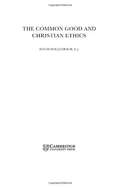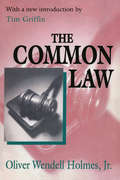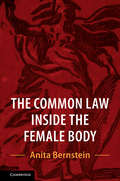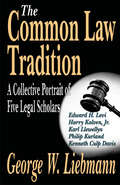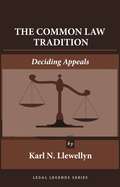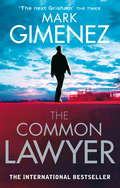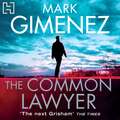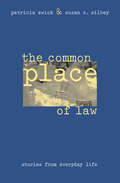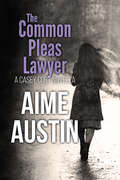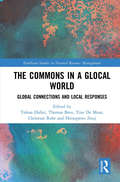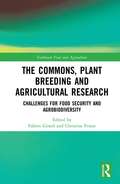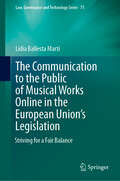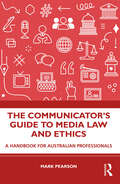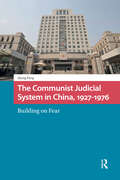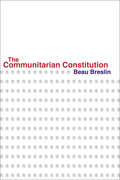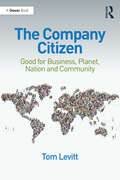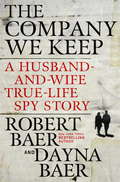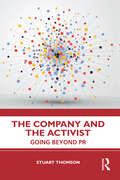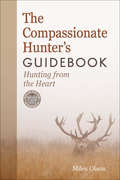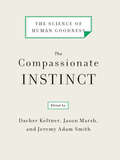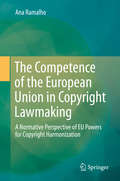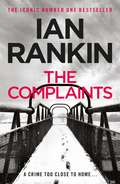- Table View
- List View
The Common Good And Christian Ethics (New Studies In Christian Ethics Ser. #Series Number 22)
by Stanley M. Hauerwas Robin Gill Stephen R. L. Clark Robin W. Lovin David HollenbachThis study rethinks the ancient tradition of the common good to addressing contemporary urban and global social divisions. David Hollenbach draws on social analysis, moral philosophy, and theological ethics to chart new directions in urban life and global society. He argues that the division between the middle class and the poor in major cities and the challenges of globalization require a new commitment to the common good. Accordingly, believers and non-believers must move towards new forms of solidarity.
The Common Law
by Oliver Wendell Holmes Jr.The Common Law is Oliver Wendell Holmes' most sustained work of jurisprudence. In it the careful reader will discern traces of his later thought as found in both his legal opinions and other writings. At the outset of The Common Law Holmes posits that he is concerned with establishing that the common law can meet the changing needs of society while preserving continuity with the past. A common law judge must be creative, both in determining society's current needs and in discerning how best to address these needs in a way that is continuous with past judicial decisions. In this way, the law evolves by moving out of its past, adapting to the needs of the present, and establishing a direction for the future. To Holmes' way of thinking, this approach is superior to imposing order in accordance with a philosophical position or theory because the law would thereby lose the flexibility it requires in responding to the needs and demands of disputing parties as well as society as a whole.
The Common Law (The John Harvard Library #108)
by Oliver Wendell HolmesMuch more than an historical examination of liability, criminal law, torts, bail, possession and ownership, and contracts, The Common Law articulates the ideas and judicial theory of one of the greatest justices of the Supreme Court. G. Edward White reminds us why the book remains essential reading not only for law students but also for anyone interested in American history. The text published is, with occasional corrections of typographical errors, identical with that found in the first and all subsequent printings by Little, Brown.
The Common Law Inside the Female Body
by Anita BernsteinIn The Common Law Inside the Female Body, Anita Bernstein explains why lawyers seeking gender progress from primary legal materials should start with the common law. Despite its reputation for supporting conservatism and inequality, today's common law shares important commitments with feminism, namely in precepts and doctrines that strengthen the freedom of individuals and from there the struggle against the subjugation of women. By re-invigorating both the common law - with a focus on crimes, contracts, torts, and property - and feminist jurisprudence, this highly original work anticipates a vital future for a pair of venerable jurisprudential traditions. It should be read by anyone interested in understanding how the common law delivers an extraordinary degree of liberty and security to all persons - women included.
The Common Law Tradition: A Collective Portrait of Five Legal Scholars
by George LiebmannThis book commemorates a place and a time in American law teaching, but more importantly, an outlook: the common law tradition. That outlook was empirical and tolerant. These values were carried into expression by a group of people who were not part of a cult or faction nor ruled by the herd instinct. Now in paperback, The Common Law Tradition is a collective portrait of five scholars who epitomize the tradition.The focus is Chicago in the 1960s. The five figures considered--Edward H. Levi, Harry Kalven, Jr., Karl Llewellyn, Philip Kurland, and Kenneth Culp Davis--did much to broaden the perspectives of the legal academy. Levi made use of sociology, economics, and comparative law. Kalven collaborated with sociologists on the Jury Project and with economists on tax law and auto compensation plans. Llewellyn's commitment to empirical research underpinned his work on the Uniform Commercial Code. Kurland's approach to constitutional law was highlighted by his insistence on the relevance of legal history. Davis was an energetic comparativist in his work on administrative law. What distinguished these Chicagoans is that their work was practical and rooted in the law, and hence yielded concrete applications. The group's diversity, the tolerant atmosphere in which they taught and wrote, and the attachment of its individual members to empirical approaches differentiate them from today's legal scholars and make their ideas of continuing importance.
The Common Law Tradition: Deciding Appeals (Legal Legends Series)
by Karl N. LlewellynIn this book, he laid bare these juris prudential tools, in support of appellate court thinking at all levels in the legal system. Legal analysis is so clearly picked apart that this work has served as a tool-kit for judicial thinking and persuasive argument to courts. And his invaluable appendices show in detail how arguments and judicial expressions can be turned around to the advocate's advantage.
The Common Lawyer
by Mark GimenezAndy Prescott is the most laid-back young lawyer in Austin, Texas. Specialising in traffic law, he operates from a small room above a ramshackle tattoo parlour. He rides a trail bike and spends way too much time drinking beer in the sunshine. Ambition has never been Andy's strong point - he prefers to take it easy.That is, until one of Texas's wealthiest men walks into his office. On the spot, billionaire Russell Reeves retains Andy as his lawyer and, in exchange for some easy legal work, pays him more money than he has ever earned before. Andy's life is transformed.But nothing comes for free. Russell is a desperate man whose sole aim is to save his eight-year-old son, Zach, who is dying from leukemia. He is prepared to do anything - even if it means putting Andy's life in danger...
The Common Lawyer
by Mark GimenezAndy Prescott is the most laid-back young lawyer in Austin, Texas. Specialising in traffic law, he operates from a small room above a ramshackle tattoo parlour. He rides a trail bike and spends way too much time drinking beer in the sunshine. Ambition has never been Andy's strong point - he prefers to take it easy.That is, until one of Texas's wealthiest men walks into his office. On the spot, billionaire Russell Reeves retains Andy as his lawyer and, in exchange for some easy legal work, pays him more money than he has ever earned before. Andy's life is transformed.But nothing comes for free. Russell is a desperate man whose sole aim is to save his eight-year-old son, Zach, who is dying from leukemia. He is prepared to do anything - even if it means putting Andy's life in danger...
The Common Place of Law: Stories from Everyday Life
by Patricia Ewick Susan S. SilbeyWhy do some people not hesitate to call the police to quiet a barking dog in the middle of the night, while others accept the pain and losses associated with defective products, unsuccesful surgery, and discrimination? Patricia Ewick and Susan Silbey collected accounts of the law from more than four hundred people of diverse backgrounds in order to explore the different ways that people use and experience it. Their fascinating and original study identifies three common narratives of law that are captured in the stories people tell. One narrative is based on an idea of the law as magisterial and remote. Another views the law as a game with rules that can be manipulated to one's advantage. A third narrative describes the law as an arbitrary power that is actively resisted. Drawing on these extensive case studies, Ewick and Silbey present individual experiences interwoven with an analysis that charts a coherent and compelling theory of legality. A groundbreaking study of law and narrative, The Common Place of Law depicts the institution as it is lived: strange and familiar, imperfect and ordinary, and at the center of daily life.
The Common Pleas Lawyer: A Casey Cort Novella (A Casey Cort Novel #0.5)
by Aime AustinSylvie Fox writing as Aime Austin shares the beginning of Casey Cort's story. Casey crosses a powerful family in this prequel novella. It's spring in Cleveland, Ohio, but Casey Cort isn't going to let rain and gray skies get her down. The last year of law school is a magical time. At any moment her long-time boyfriend, Tom Brody, is going to pop the question. She's ready to finish a successful year as a senior editor on the law review, and her dream job at Morrell Gates is right around the corner. The bar exam is her last hurdle, and she's more than ready to jump it. Or so she thinks. When Casey reports an honor code violation to the dean of the law school, her perfect future comes crashing down around her as friends and fellow students fail to come to her rescue. In this prequel novella of the Casey Cort series, Aime Austin--a former trial lawyer in Cleveland--weaves a tale that blends the best of today's top legal thrillers with the heart and soul of women's fiction, in a story ripped from real-world headlines.
The Commons in a Glocal World: Global Connections and Local Responses (Earthscan Studies in Natural Resource Management)
by Tine De Moor Tobias Haller Thomas Breu Christian Rohr Heinzpeter ZnojThis volume focuses on how, in Europe, the debate on the commons is discussed in regard to historical and contemporary dimensions, critically referencing the work of Elinor Ostrom. It also explores from the perspective of new institutional political ecology (NIPE) how Europe directly and indirectly affected and affects the commons globally. Most of the research on the management of commons pool resources is limited to dealing with one of two topics: either the interaction between local participatory governance and development of institutions for commons management, or a political- economy approach that focuses on global change as it is related to the increasingly globalised expansion of capitalist modes of production, consumption and societal reproduction. This volume bridges the two, addressing how global players affect the commons worldwide and how they relate to responses emerging from within the commons in a global- local (glocal) world. Authors from a range of academic disciplines present research findings on recent developments on the commons, including: historical insights; new innovations for participatory institutions building in Europe or several types of commons grabbing, especially in Africa related to European investments; and restrictions on the management of commons at the international level. European case studies are included, providing interesting examples of local participation in commons resource management, while simultaneously showing Europe as a centre for globalized capitalism and its norms and values, affecting the rest of the world, particularly developing countries. This book will be of interest to students and researchers from a wide range of disciplines including natural resource management, environmental governance, political geography and environmental history.
The Commons, Plant Breeding and Agricultural Research: Challenges for Food Security and Agrobiodiversity (Earthscan Food and Agriculture)
by Christine Frison Fabien GirardThe joint challenges of population increase, food security and conservation of agrobiodiversity demand a rethink of plant breeding and agricultural research from a different perspective. While more food is undeniably needed, the key question is rather about how to produce it in a way that sustains biological diversity and mitigates climate change. This book shows how social sciences, and more especially law, can contribute towards reconfiguring current legal frameworks in order to achieving a better balance between the necessary requirements of agricultural innovation and the need for protection of agrobiodiversity. On the assumption that the concept of property can be rethought against the background of the 'right to include', so as to endow others with a common 'right to access' genetic resources, several international instruments and contractual arrangements drawn from the plant-breeding field (including the Convention on Biological Diversity, technology exchange clearing houses and open sources licenses) receive special consideration. In addition, the authors explore the tension between ownership and the free circulation and exchange of germplasm and issues such as genetic resources managed by local and indigenous communities, the ITPGRFA and participatory plant-breeding programmes. As a whole, the book demonstrates the relevance of the 'Commons' for plant breeding and agricultural innovation.
The Communication to the Public of Musical Works Online in the European Union’s Legislation: Striving for a Fair Balance (Law, Governance and Technology Series #75)
by Lídia Ballesta MartíThis book offers an in-depth analysis of EU copyright legislation and the evolving jurisprudence of the Court of Justice of the European Union (CJEU) to assess whether the current legal framework provides adequate protection for the right of communication to the public in musical works. It critically examines whether EU law strikes a fair balance between the interests of rightsholders, online music service providers, and users. Technological innovation over the past two decades has dramatically reshaped the music industry and challenged traditional copyright norms. The emergence of digital distribution platforms and music streaming services has made it imperative to rethink how the right of communication to the public is protected in the online environment. In response, the EU introduced a series of reforms aimed at modernizing copyright rules for the Digital Single Market. But how effective are these measures? And do they truly reflect the diverse interests at stake? This comprehensive volume explores both the international and EU legal frameworks governing the right of communication to the public. It offers a detailed interpretation of relevant legislation and landmark case law, with a particular focus on the controversial liability regime established by Article 17 of Directive 2019/790. The book also addresses enforcement challenges, including cross-border issues of jurisdiction and applicable law. Beyond legal analysis, the book proposes thoughtful, practical solutions to help create a more equitable digital music ecosystem. Written in a clear and accessible style, it demystifies complex legal concepts for a broad readership—including IP lawyers, music creators, platform operators, policymakers, and informed users.
The Communicator's Guide to Media Law and Ethics: A Handbook for Australian Professionals
by Mark PearsonThis book offers an introduction to the key legal and ethical topics confronting Australian journalists and strategic communicators both at home and internationally and offers a suite of reflective techniques for navigating them. It starts by positioning morals, ethics, and the law in their historical and philosophical frameworks by tracing the evolution of free expression and professional media ethics. Media law and ethics are then contextualized in their modern international human rights framework. Readers are equipped with a skill set for reflecting on the law and ethics of professional media dilemmas – including mindful reflection, the Potter Box, journaling, concept mapping, and discussion. Such approaches are then applied to key topic areas, including free expression; reputation; confidentiality; privacy; justice; intellectual property; national security; discrimination and harassment; and conflicted interests. Each is examined in terms of its philosophical underpinnings, relationship to human rights, professional ethical context, international examples, legal principles, key Australian laws, legal cases, and strategies for applying reflective practice techniques. It concludes on a confident note – imploring communicators to engage in constructive and mindful strategic communication with the authority and confidence that results from a working knowledge of media law and ethics. This handbook is for professional communicators and students in all fields, but particularly in journalism, public relations, corporate communication, media relations, and marketing.
The Communist Judicial System in China, 1927-1976: Building on Fear (China: From Revolution to Reform)
by Qiang FangDrawing on hundreds of newly released judicial archives and court cases, this book analyzes the communist judicial system in China from its founding period to the death of Mao Zedong. It argues that the communist judicial system was built when the CCP was engaged in a life-or-death struggle with the GMD, meaning that the overriding aim of the judicial system was, from the outset, to safeguard the Party against both internal and external adversaries. This fundamental insecurity and perennial fear of loss of power obsessed the Party throughout the era of Mao and beyond, prompting it to launch numerous political campaigns, which forced communist judicial cadres to choose between upholding basic legal norms and maintaining Party order. In doing all of this, The Communist Judicial System in China, 1927-1976: Building on Fear fills a major lacuna in our understanding of communist-era China.
The Communitarian Constitution
by Beau BreslinBowling Alone, the title of Robert Putnam's 1995 article (later a bestselling book) perfectly captured a sense of national unease: Somewhere along the way, America had become a nation divided by apathy, and the bonds that held together civil society were disappearing. But while the phrase resonated with our growing sense of atomization, it didn't describe a new phenomenon. The fear that isolation has eroded our social bonds had simmered for at least two decades, when communitarianism first emerged as a cogent political philosophy. Communitarianism, as explained in the works of Michael Sandel, Alasdair MacIntyre, Amitai Etzioni, and others, elevates the idea of communal good over the rights of individuals.Throughout the 1980s and 1990s, communitarianism gained popular and political ground. The Clintons touted its principles in the '90s, and the two presidents Bush make frequent references to its central tenets. In its short life, the philosophy has generated plenty of books, both pro and con. Beau Breslin's authoritative and original examination, The Communitarian Constitution, contributes to the debate from a wholly original standpoint. Existing critiques focus on the debate between liberalism and communitarianism—in other words, the conflict between individual rights and the communal good. Breslin takes an entirely different stance, examining the pragmatic question of whether or not communitarian policies are truly practicable in a constitutional society.In tackling this question, Breslin traces the evolution of American communitarianism. He examines Lincoln's unconstitutional Civil War suspension of habeas corpus and draws on Federalist and Anti-Federalist arguments, pegging the Anti-Federalists as communitarians' intellectual forebearers. He also grounds his arguments in the real world, examining the constitutions of Germany and Israel, which offer further insight into the relationship between constitutionalism and communitarianism.At a moment when American politicians and citizenry are struggling to balance competing needs, such as civil rights and homeland security, The Communitarian Constitution is vital reading for anyone interested in the evolving tensions between individual rights and the good of the community.
The Company Citizen: Good for Business, Planet, Nation and Community
by Tom LevittBusiness doing good is doing good business; this book learns from the era where governments ruled the world, pre-globalisation, and where business looked after itself, where issues like climate change, resource depletion and even poverty and hunger were not thought to be the responsibility of business. The Company Citizen concludes that not only are these key issues for business today but that the world will not be able to manage these issues without the active participation - even leadership - of business. Aware of the shortcomings of both government and civil society the author argues that environmental sustainability, economic and social inclusion and the better management of resources are all key issues for business and that it makes good business sense to manage them better. This book examines the case for the company citizen on a global, national and community level working alongside other. Never has the conscientious company citizen, as envisaged by 19th century Quaker philanthropists, been more needed; and never has that business case, one that justifies a long-term commitment to practical corporate behaviour for good, been more clear. Drawing attention both to the businesses that are taking the lead and those who are holding us back, the author concludes that only by involving business can we tackle the great issues of the day - and survive, as communities, nation and planet.
The Company We Keep: A Husband-and-Wife True-Life Spy Story
by Robert Baer Dayna Baer New York Times Bestselling Author of See No EvilRobert Baer was known inside the CIA as perhaps the best operative working the Middle East. Over several decades he served everywhere from Iraq to New Delhi and racked up such an impressive list of accomplishments that he was eventually awarded the Career Intelligence Medal. But if his career was everything a spy might aspire to, his personal life was a brutal illustration of everything a spy is asked to sacrifice. Bob had few enduring non-work friendships, only contacts and acquaintances. His prolonged absences destroyed his marriage, and he felt intense guilt at spending so little time with his children. Sworn to secrecy and constantly driven by ulterior motives, he was a man apart wherever he went. Dayna Williamson thought of herself as just an ordinary California girl -- admittedly one born into a comfortable lifestyle. But she was always looking to get closer to the edge. When she joined the CIA, she was initially tasked with Agency background checks, but the attractive Berkeley graduate quickly distinguished herself as someone who could thrive in the field, and she was eventually assigned to Protective Operations training where she learned to handle weapons and explosives and conduct high-speed escape and evasion. Tapped to serve in some of the world's most dangerous places, she discovered an inner strength and resourcefulness she'd never known -- but she also came to see that the spy life exacts a heavy toll. Her marriage crumbled, her parents grew distant, and she lost touch with friends who'd once meant everything to her. When Bob and Dayna met on a mission in Sarajevo, it wasn't love at first sight. They were both too jaded for that. But there was something there, a spark. And as the danger escalated and their affection for each other grew, they realized it was time to leave the Company, to somehow rediscover the people they'd once been. As worldly as both were, the couple didn't realize at first that turning in their Agency I. D. cards would not be enough to put their covert past behind. The fact was, their clandestine relationships remained. Living as civilians in conflict-ridden Beirut, they fielded assassination proposals, met with Arab sheiks, wily oil tycoons, terrorists, and assorted outlaws and came perilously close to dying. But even then they couldn't know that their most formidable challenge lay ahead. Simultaneously a trip deep down the intelligence rabbit hole one that shows how the game actually works, including the compromises it asks of those who play by its rules -- and a portrait of two people trying to regain a normal life, The Company We Keep is a masterly depiction of the real world of shadows.
The Company and the Activist: Going Beyond PR
by Stuart ThomsonAddressing the rise of a new breed of activists who present a real threat not only to reputations but to business operations, this book explores what businesses need to understand about these communities, why they should be taken seriously, and how business leaders can successfully navigate this shifting terrain.Existing business books address only the communications challenges involved in the rise of these new communities, but this book goes beyond PR issues to the very real impact on business decisions – and acknowledges that businesses must understand activists, and vice versa, if progress is to be made. To lead this conversation, the book includes interviews and contributions from key players across activism and businesses to look at how both sides operate and what success looks like for them. It also features practical steps that businesses can take to build a network of supporters, drawing on global examples from the corporate sector, grassroots campaigns, and people and organisations taking up the mantle of activism.Leaders and professionals working in all aspects of business, across industries and firm types, will appreciate learning about what drives activists and how businesses can work with them to not only avoid reputational damage, but to create stronger connections and, perhaps, a better world.
The Compassionate Hunter's Guidebook: Hunting from the Heart (Mother Earth News Books for Wiser Living)
by Miles Olson&“This book reminds us that hunting provides sustenance for both body and soul, and that mindful eating requires both respect and gratitude.&”—Tovar Cerulli, author of The Mindful Carnivore Wild meat, hunted in a responsible way, is one of the most healthful, sustainable foods possible. Depending on how it is done, hunting can be as local, intimate and humane as it gets. And aside from this, it demands the hunter enter a world of awareness, wildness, life and death that as a culture we have lost connection to. The Compassionate Hunter&’s Guidebook is for those who come to the act of hunting with pure intentions, motivated by a desire for healthy food that comes directly from the land where they live. This practical manual suggests that hunting is not a &“sport&” and the animals whose lives are taken are not &“game.&” It combines a deep, philosophical exploration of the ethics of killing with detailed instructions on every step of the process including: Understanding your preyTools, techniques and preparationThe act of the huntFrom forest to table—processing, preserving and preparing your kill. A unique and comprehensive, fully-illustrated guide to the complexity, ethics and spirit of the hunt, The Compassionate Hunter is a must-read for beginning and experienced hunters alike. It will appeal to anyone who wishes to delve more deeply into the complex, humbling and ultimately profound reality of our relationship with the food that nourishes us. &“Arguably the food that most closely approximates our nutritional needs, wild game assumes a sacred and satiating beauty in The Compassionate Hunter.&”—Joel Salatin, farmer and author of Pastured Poultry Profits
The Compassionate Instinct: The Science of Human Goodness
by Jason Marsh Dacher Keltner Jeremy Adam SmithLeading scientists and science writers reflect on the life-changing, perspective-changing, new science of human goodness. In these pages you will hear from Steven Pinker, who asks, "Why is there peace?"; Robert Sapolsky, who examines violence among primates; Paul Ekman, who talks with the Dalai Lama about global compassion; Daniel Goleman, who proposes "constructive anger"; and many others. Led by renowned psychologist Dacher Keltner, the Greater Good Science Center, based at the University of California in Berkeley, has been at the forefront of the positive psychology movement, making discoveries about how and why people do good. Four times a year the center publishes its findings with essays on forgiveness, moral inspiration, and everyday ethics in Greater Good magazine. The best of these writings are collected here for the first time. A collection of personal stories and empirical research, The Compassionate Instinct will make you think not only about what it means to be happy and fulfilled but also about what it means to lead an ethical and compassionate life.
The Competence of the European Union in Copyright Lawmaking
by Ana RamalhoThis book inquires into the competence ofthe EU to legislate in the field of copyright, and uses content analysistechniques to demonstrate the existence of a normative gap in copyrightlawmaking. To address that gap, it proposes the creation of benchmarks oflegislative activity, reasoning that EU secondary legislation, such as directivesand regulations, should be based on higher sources of law. It investigates twosuch possible sources: the activity of the EU Court of Justice in thepre-legislative era and the EU treaties. From these sources, the authorestablishes concrete benchmarks of legislative activity, which she then testsby applying them to current EU copyright legislation. This provides examples ofgood and bad practices in copyright lawmaking and also shows how the benchmarkscould be implemented in copyright legislation. Finally, the author offers somerecommendations in this regard.
The Complaints
by Ian Rankin'Unmissable Rankin, as gripping and involving as any Rebus story' CHOICE; 'A brilliant book' GUARDIANFrom the No.1 bestselling author of A SONG FOR THE DARK TIMES'On the evidence of THE COMPLAINTS it looks as if Fox will be just as sure-footed a guide to the city as his grizzled predecessor' DAILY EXPRESS.Nobody likes The Complaints - they're the cops who investigate other cops. Complaints and Conduct Department, to give them their full title, but known colloquially as 'the Dark Side', or simply 'The Complaints'. Malcolm Fox works for The Complaints. He's just had a result, and should be feeling good about himself. But he's middle-aged, sour and unwell. He also has a father in a care home and a sister who persists in an abusive relationship. In the midst of an aggressive Edinburgh winter, the reluctant Fox is given a new task. There's a cop called Jamie Breck, and he's dirty. Problem is, no one can prove it. But as Fox takes on the job, he learns that there's more to Breck than anyone thinks. This knowledge will prove dangerous, especially when murder intervenes.
The Complaints
by Ian Rankin'Unmissable Rankin, as gripping and involving as any Rebus story' CHOICE; 'A brilliant book' GUARDIANFrom the No.1 bestselling author of A SONG FOR THE DARK TIMES'On the evidence of THE COMPLAINTS it looks as if Fox will be just as sure-footed a guide to the city as his grizzled predecessor' DAILY EXPRESS.Nobody likes The Complaints - they're the cops who investigate other cops. Complaints and Conduct Department, to give them their full title, but known colloquially as 'the Dark Side', or simply 'The Complaints'. Malcolm Fox works for The Complaints. He's just had a result, and should be feeling good about himself. But he's middle-aged, sour and unwell. He also has a father in a care home and a sister who persists in an abusive relationship. In the midst of an aggressive Edinburgh winter, the reluctant Fox is given a new task. There's a cop called Jamie Breck, and he's dirty. Problem is, no one can prove it. But as Fox takes on the job, he learns that there's more to Breck than anyone thinks. This knowledge will prove dangerous, especially when murder intervenes.
